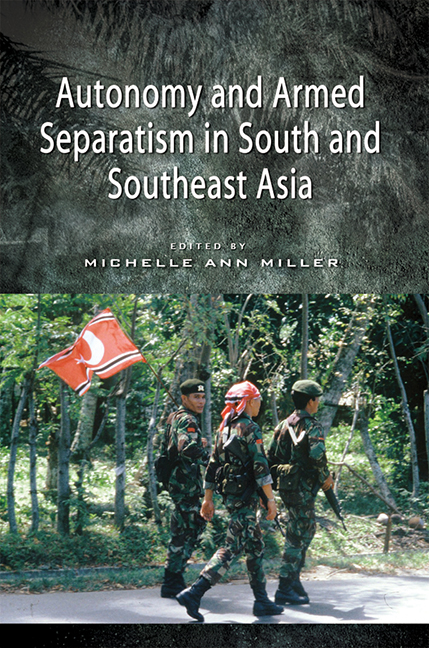Book contents
- Frontmatter
- Dedication
- Contents
- Acknowledgements
- About the Contributors
- 1 The Problem of Armed Separatism: Is Autonomy the Answer?
- 2 Mediated Constitutionality as a Solution to Separatism
- 3 Self-Governance as a Framework for Conflict Resolution in Aceh
- 4 Autonomy and Armed Separatism in Papua: Why the Cendrawasih Continues to Fear the Garuda
- 5 The Parallels and the Paradox of Timor-Leste and Western Sahara
- 6 Between Violence and Negotiation: Rethinking the Indonesian Occupation and the East Timorese Resistance
- 7 Struggle over Space in Myanmar: Expanding State Territoriality after the Kachin Ceasefire
- 8 Sri Lanka's Ethnic Conflict: The Autonomy-Separation Dialectic
- 9 Unitarianism, Separatism and Federalism: Competing Goals and Problems of Compromise in Sri Lanka
- 10 Autonomy and Armed Separatism in Jammu and Kashmir
- 11 Armed Conflicts and Movements for Autonomy in India's Northeast
- 12 Southern Thailand: The Trouble with Autonomy
- 13 The Last Holdout of an Integrated State: A Century of Resistance to State Penetration in Southern Thailand
- 14 Interlocking Autonomy: Manila and Muslim Mindanao
- 15 History, Demography and Factionalism: Obstacles to Conflict Resolution through Autonomy in the Southern Philippines
- 16 Conclusion
- Index
14 - Interlocking Autonomy: Manila and Muslim Mindanao
Published online by Cambridge University Press: 21 October 2015
- Frontmatter
- Dedication
- Contents
- Acknowledgements
- About the Contributors
- 1 The Problem of Armed Separatism: Is Autonomy the Answer?
- 2 Mediated Constitutionality as a Solution to Separatism
- 3 Self-Governance as a Framework for Conflict Resolution in Aceh
- 4 Autonomy and Armed Separatism in Papua: Why the Cendrawasih Continues to Fear the Garuda
- 5 The Parallels and the Paradox of Timor-Leste and Western Sahara
- 6 Between Violence and Negotiation: Rethinking the Indonesian Occupation and the East Timorese Resistance
- 7 Struggle over Space in Myanmar: Expanding State Territoriality after the Kachin Ceasefire
- 8 Sri Lanka's Ethnic Conflict: The Autonomy-Separation Dialectic
- 9 Unitarianism, Separatism and Federalism: Competing Goals and Problems of Compromise in Sri Lanka
- 10 Autonomy and Armed Separatism in Jammu and Kashmir
- 11 Armed Conflicts and Movements for Autonomy in India's Northeast
- 12 Southern Thailand: The Trouble with Autonomy
- 13 The Last Holdout of an Integrated State: A Century of Resistance to State Penetration in Southern Thailand
- 14 Interlocking Autonomy: Manila and Muslim Mindanao
- 15 History, Demography and Factionalism: Obstacles to Conflict Resolution through Autonomy in the Southern Philippines
- 16 Conclusion
- Index
Summary
For more than thirty years there have been a variety of “autonomous governments” in areas of Mindanao. Over the course of six national administrations, numerous regional administrations, and varying intensities of separatist armed conflict, there is general agreement that “autonomy” has not resolved the issues plaguing Muslim Mindanao. Explanations for such systematic failure must go beyond accusations of bad faith or incompetence. This paper examines the multifaceted incentives faced by factions on both sides — Mindanao Muslims and Manila elites — which shape forms of autonomy in Mindanao and limit their effectiveness in addressing grievances which drive separatist sentiment. It concludes with suggestions for ways forward that might satisfy both sides in the interaction.
The current period of armed conflict between Muslims in the Philippines and the central state in Manila has now lasted over thirty-five years. In 1968 two events occurred that stirred rebellion. In the “Jabidah massacre” Muslims who had been recruited into the military in order to invade Sabah were slain by their officers when the operation was shut down (one survived to tell the tale) (Dañguilan and Gloria 2000, pp. 2–23). In the same year, a “Muslim Independence Movement” (MIM) was organized by former Governor of Cotabato Province, Datu Udtog Matalam who was disappointed by his role within Manila-centric politics (Abinales 2000, pp. 140–41, 167–68). The movement acquired an armed component with the founding of the Moro National Liberation Front (MNLF) in the early 1970s.
Reasons that have been adduced for the length of this confrontation range from the insincerity of the national government in addressing grievances, to the self-interest of the actors (the Armed Forces of the Philippines or the local warlords who profit from the war's continuance), to divisions within the Muslim community (within and among revolutionary movements, traditional leaders and elected politicians) whose inability to unite hampers the achievement of their goals. One attempt at resolving the conflict has involved instituting “autonomous governments” in areas of Mindanao, with new varieties being instituted in 1977, 1990, and 2001. While decentralization (ranging from increased autonomy for local governments to changing the nature of the Philippine state from a unitary one to a federation) has long been, and continues to be, a feature in discourses about governance in the Philippines, “autonomy” in Mindanao has been a special case — not available to the rest of the Philippines.
- Type
- Chapter
- Information
- Autonomy and Armed Separatism in South and Southeast Asia , pp. 256 - 277Publisher: ISEAS–Yusof Ishak InstitutePrint publication year: 2012



